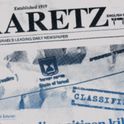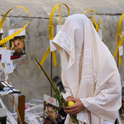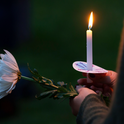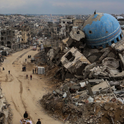Qassam rockets rise surprisingly slowly, leaving faint scribbles of smoke in an early evening sky, like fireworks let off prematurely. We watched them as we sipped dusty sweet coffee last Wednesday, waiting for the Palestinian police at the Erez crossing between Gaza and Israel to check our passports. As each rocket rose there came a shout from the men who hang around the checkpoint to see if they can make a shekel or two carrying luggage across the free-fire zone to the Israeli side. It is hard and dangerous work, but there are not many jobs in Gaza today—by some reports unemployment is up 30 per cent since the blockade began last June. Gaza City looks pretty much like any poor Arab town, apart from the bullet scars; the oddest thing at first sight is how many men are on the streets.
As we walked across the wasteland to the high wall that keeps Gazans out of Israel, two thin smoke trails rose simultaneously into the pale blue sky, half a kilometre or so away. We watched them come to their apex and begin to fall. A second or so later, we heard twin thuds. The target was Sderot. The Israeli town lies less than a thousand metres over the border, in easy reach of the home-made Qassams. Sometimes a hundred of these crude two-metre rockets land on the little university town in a month—but only rarely do they cause casualties. On Wednesday, Hamas militants fired 40 Qassams, an expression of anger at an Israeli air assault in Khan Younis early in the morning that had killed five of Hamas's "best fighters."
Ten minutes later we were sitting by the bare grey concrete of the Israeli security wall, under a sign reading "Weapons is not permitted." Everyone smoked, an old man in an Arab headdress nodded off to sleep on the ground: getting through the Israeli border point takes a lot of patience. The electronic doors and turnstiles stay locked until someone, somewhere, decides they should open. The Oxfam team I was travelling with had been held up for two hours on Wednesday, four hours the day before. As we chatted, watching another smoke trail rise in the sky, a Channel 4 reporter's mobile phone rang. The pair of rockets we'd watched rise so unimpressively had killed a middle-aged father in Sderot. And then we heard thuds that seemed to come from behind us—an Israeli rocket strike on Gaza City.
The next explosion was much nearer—close enough to take your breath away and to rattle the plate glass windows of the vast border building. By then we were outside it, in Israel. Qassams suddenly seemed more scary: no one complained when the Israeli security guards shuffled us into a secure room in the centre of the building to await more attacks. When we were allowed to leave, half an hour later, we scuttled to our cars in fear, hearing the roars behind us that marked the full opening of Israel's retaliation.
It was the beginning of—what? You could hardly call anything so one-sided a battle. A skirmish? A collective punishment of the Gaza ghetto? A rise in the horror level? A surge in the asymmetric war? Israel attacked from the sea, the air and on the ground: by Monday 3rd March, the toll was 106 Palestinians dead. The Israeli army said 90 per cent of then were armed militants. B'Tselem, the reliable Israeli human rights group, had done an assessment of the casualties and said that at least 54 of the dead were "uninvolved civilians," and 25 of those were children. Israel had lost two soldiers, and the father killed by the Qassams we saw. But the general view was that Hamas were the victors in the encounter—they had won the PR skirmish, that is, and that's the one that counts. No newspaper, in Israel or elsewhere, thought that Prime Minister Ehud Olmert's stated aim for the five-day mini-war—"weakening Hamas"—had in any way been achieved. As I write, the rocket attacks into Israel continue. And Olmert threatens a "full-scale invasion."
We could not go back to Gaza on Thursday. We had hoped to visit Oxfam's work with the municipal water authorities to shore up the Strip's collapsing sewage systems. Instead we sat in Jerusalem, watching the news with the added concentration that comes when you're just back from the place they're talking about. Early on we heard that one overnight Israeli rocket attack had destroyed the offices, pharmacy and mobile ambulance-clinic of the Palestinian Medical Relief Society, an Oxfam-funded partner.
Then, to my horror, I heard that an Israeli rocket attack had killed four children, aged between 8 and 12, playing football in the Beach refugee camp. The strike had been aimed at the modest house of Hamas's prime minister, Ismail Haniyeh. I began to worry: I'd spent much of the previous morning just two doors away, interviewing a mother of nine children about her daily life, watching her turn the UN food aid on which 80 per cent of Gazans now depend into a meal of pitta bread and beans stewed with garlic, chilli and herbs for her family. (It was delicious—but I don't have to eat it every day). But a phone call to the Oxfam staff on Gaza revealed that Fathiya and her children were fine. The football players had died in the Jabalia refugee camp, a little further north.
I reported on Israel and the Palestinian territories regularly for the London Evening Standard between 1996 and 2001. This was my first time back, and I have never seen change so shocking and so rapid. It wasn't just the shock of the west bank security wall, emblematically powerful and effective at reducing suicide attacks as it is. (It's also a blight: a surer destroyer of Palestinian livelihoods than any other single Israeli act since the war of 1967). What really shocked me was just how radically the language of Israeli politicians has changed, now that the peace process is dead. The discourse of Palestinian militancy has always been laden with blood-soaked hyperbole. But Israelis used to be more civilised. I thought back to the premiership of Ehud Barak, who in 2000 so nearly concluded a peace deal with Yasser Arafat, and to Barak's bitter regret when Arafat refused to sign. Now, as defence minister, he blithely spoke of the assault on Gaza as a "proportionate response" to Hamas's killing of one Israeli civilian.
As was widely reported, Barak's deputy defence minister, Matan Vilnai, told the Palestinians on 29th February that if they continued rocket attacks, they would face a "bigger Shoah"—the term commonly used for the Holocaust, inside Israel and out (although Vilnai's spokesman later said, under pressure, that he only meant "a bigger disaster"). This shocked many outside Israel—especially those of its critics and allies who believe that the crimes of Nazi Germany must not be used for analogies with today's conflicts. But this sort of language is now commonplace among senior politicians. On the previous day, Avi Dichter, the internal security minister—one of whose bodyguards was injured by a Qassam last week—said that the only dialogue needed with Hamas was "a dialogue of fire."
No talks? When I was here before, there was hope in talks. All people seemed to do was call for talks, have talks, analyse them and plan some more. It kept things going, kept the hope ball rolling. Now no politician wants talks, despite Hamas's offers of ceasefire. And the only sliver of hope I saw last week was in the fact that Israelis still disagree with their leaders—64 per cent, according to a Ha'aretz poll, want talks with Hamas. And this includes supporters of right-wing parties. No one asked the people of Gaza. But I think they would agree.
Discuss this piece at First Drafts, Prospect's blog











